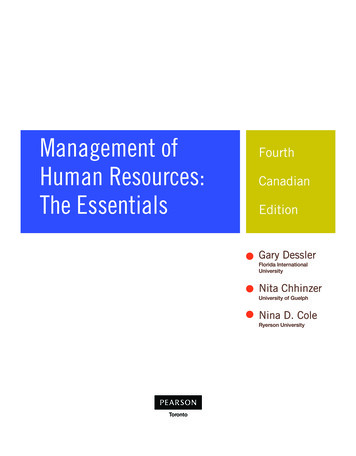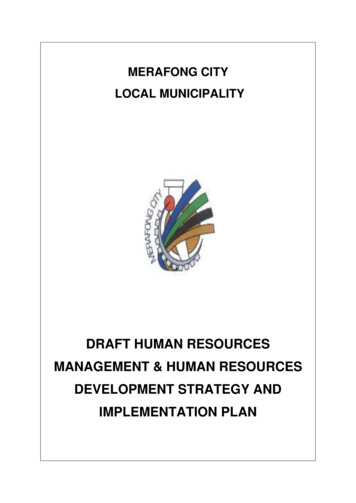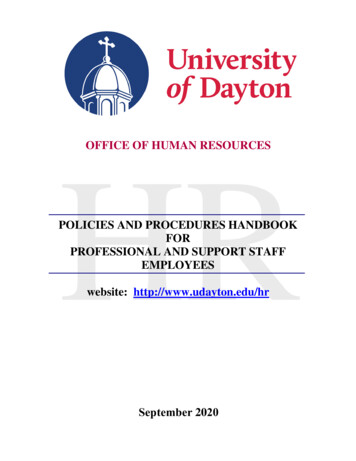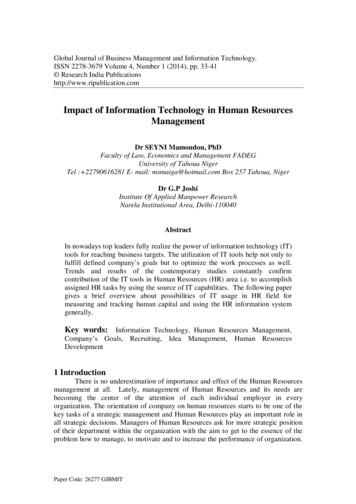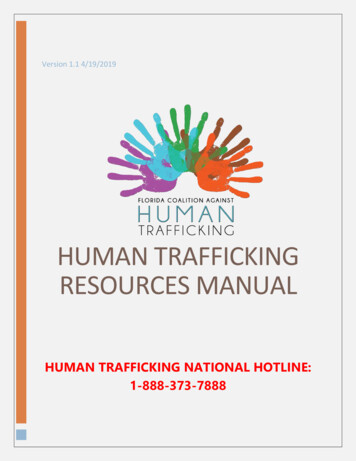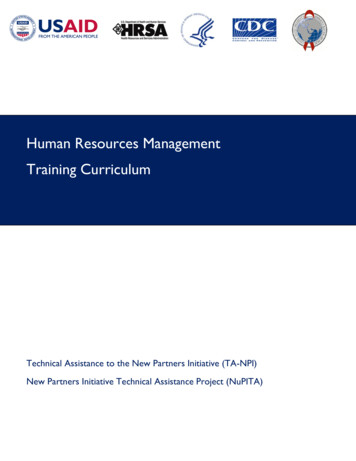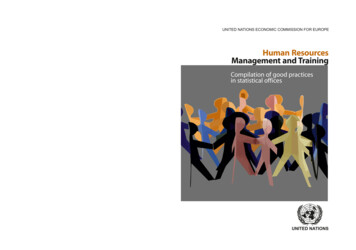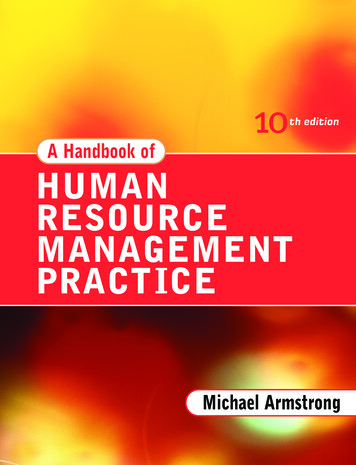
Transcription
STATE HUMAN RESOURCES MANUALTrainingSection 9, Page 1Revised: October 6, 2016Academic AssistanceContents:PurposeEligibilitySelective Service RegistrationOrigination of RequestAcademic SourcesApproved CoursesCertification and LicensingLeaveReimbursementThesis and Dissertation Research CoursesCourses Taken at Agency RequestAdministration ResponsibilityProceduresApproval of ApplicationMaintaining RecordsPurposeThe purpose of the academic assistance program is for workforce planning anddevelopment. It provides a tool for managers and employees to support academicactivities that directly relate to the organization’s identified knowledge, skills, andbehaviors (organizational competencies), and which support the mission, vision, andvalues of the organization. The academic assistance program is not an employee benefit,right or entitlement; it is a management program for workforce development. Denial ofparticipation in the academic assistance program is not grievable, except on grounds ofdiscrimination.Utilization of the academic assistance program shall be identified, described, anddocumented in the employee’s individual development plan. This provides a measurablelink between the employee’s increased competency and the agency’s workforce planningefforts.The academic assistance program provides reimbursement of academic costs if funds areavailable at the agency level, and/or time off the job if the course is available only duringworking hours.Academic Assistance
STATE HUMAN RESOURCES MANUALTrainingSection 9, Page 2Revised: October 6, 2016Academic AssistanceEligibilityFull-time and part-time (half time or more) permanent, probationary and time-limitedemployees are eligible for Academic Assistance.Probationary employees are eligible after satisfactory performance for a period of not lessthan six months as determined by management.Temporary and part-time (less than half time) are not eligible.Selective Service RegistrationNCGS 143B-421.1 requires those eligible for selective service to be registered in order tobe reimbursed academic costs. The federal Selective Service law specifies that males,both US citizens and immigrant aliens residing in the US and its territories, ages 18through 25, shall register with the Selective Service.Origination of RequestRequests for academic assistance may be initiated by the employee or management.Employee initiated to: Maintain/enhance current skills Develop new skills/competencies for career development within the agencyManagement initiated course to: Ensure employees have mandated licensure or certification Address a shortage of skilled workers in specific classifications Develop a pool of employees for workforce planning Build specific high priority skills Address performance expectations of the employee as specified in theperformance management improvement plan.Academic Assistance
STATE HUMAN RESOURCES MANUALTrainingSection 9, Page 3Revised: October 6, 2016Academic AssistanceAgency:The designation, “management initiated,” can only be determined with the approval of theagency head (at Departmental/University level), or designee.Job-related degrees and corresponding non-work related courses within a degreeprogram may be approved at the discretion of management.Academic SourcesAcademic courses/degrees from accredited community colleges/colleges/universities via traditional classroom, video-based, distance learning, web-based, eLearning and certain correspondence courses (see Ineligible Sources below) are eligiblefor approval.Academic courses are defined as a course/degree provided by an accredited communitycollege/college/university. The course must provide academic credit (as opposed toCEUs), be listed in the college/university course catalog and charge tuition in thetraditional meaning of tuition (as opposed to only registration fees). Accreditation must bevia an accrediting agency recognized by the US Department of Education.Ineligible Sources - Correspondence courses not accredited by an accrediting agencyrecognized by the US Department of Education or the Council for Higher EducationAccreditation for academic credit are not eligible under this policy.Approved CoursesManagement, when making the determination whether to provide academic assistance totake a specific course, must consider the basic principle: “deemed beneficial to both theagency and the employee.”Completion of the course should have a direct benefit to the organization. The improvedknowledge, skills and abilities gained by the employee should benefit the individual inAcademic Assistance
STATE HUMAN RESOURCES MANUALTrainingSection 9, Page 4Revised: October 6, 2016Academic Assistancecompletion of his/her current and/or potential job duties. Management should considerworkforce planning, succession planning and career development in approving employeesto receive academic assistance.Guidelines to consider in course selection are: Courses which provide knowledge and skills directly related to maintaining orimproving current job skills; and also courses mandated by law or regulation as ajob requirement for continued employment. Courses directly related to the employee’s current job or a documented workforceneed.When approving courses, management must consider workforce planning in developingemployees who demonstrate the ability to perform at a higher level of responsibility. Hardto recruit classifications are areas in which an employee could be approved to takecourses outside his/her current classification level to meet future work needs. Examplesof this are: technicians working on a college degree to fill professional engineering positionsor health care workers participating in a nursing program, and courses included in an academic program which are necessary to complete amanagement approved degree program.Academic assistance shall not be approved for courses where management hasdetermined that neither the course nor degree is of benefit to the agency.The agency head or designee may approve exceptions to the approved course policy.Audited Courses - Academic courses which are audited are eligible for academicassistance; however, an employee may be reimbursed for the same course or courseequivalent only once. Reimbursement requires a statement written on school letterheadAcademic Assistance
STATE HUMAN RESOURCES MANUALTrainingSection 9, Page 5Revised: October 6, 2016Academic Assistanceand signed by the instructor that the employee attended at least 85% of the scheduledclass meetings during the academic term.Certification/Licensing (Post-Employment)Incumbent employees who meet minimum educational requirements for employment andfor whom certification/licensing is required after employment or is deemed desirable bymanagement and approved by the agency head or designee are eligible for academicassistance under the following conditions: Certification/licensing is mandated or Certification/licensing is a policy requirement of the employing agency.Academic assistance is authorized for certification or licensing only if the certification orlicense is attained via academic course work.LeaveAn approved course should be taken on the employee’s own time. If a course can be takenonly during working hours, eligible employees must request academic leave prior to thebeginning of the course allowing sufficient time for the academic assistance request to bereviewed. A leave of absence with or without pay may be approved in compliance with theEducational Leave Policy located in Section 5 of the State Human Resources Manual.ReimbursementAcademic Costs - Eligible employees approved for academic assistance may bereimbursed academic costs charged by the academic source at which the employee isenrolled. Academic costs are defined as charges assessed by an academic source toevery person enrolling for the course. These charges are required of everyone and areneither negotiable nor discretionary for the individual enrolling in the course. Academiccosts include in-state tuition, fees and course/lab fees. Course/lab fees must always beitemized. Reimbursement of course/lab fees may require a written statement from theacademic source justifying the fee as a required fee in addition to other fees.Academic Assistance
STATE HUMAN RESOURCES MANUALTrainingSection 9, Page 6Revised: October 6, 2016Academic AssistanceAmount of Reimbursement - Eligible employees may be reimbursed academic costscharged by the academic source where enrolled. Agencies/universities may reimburse allacademic costs as specified in the paragraph “Academic Costs,” or reimburse only tuitionand other academic-related fees, but not fees unrelated to registering for a course or adegree program, such as dorm, student union construction, athletic fees, student healthservice, cultural event fees, etc.Agencies may also, with a bona fide business justification, reduce the amount ofreimbursement per employee to a set amount less than the tuition and fees and/or limitthe number of courses for which any one employee may be reimbursed in an academicterm.Agencies/universities choosing to reimburse an amount less than the academic costsspecified in the paragraph “Academic Costs” shall make this information available to allemployees at the beginning of the fiscal year and at the beginning of each semester, andapply this limitation in a fair and equitable manner to all employees requesting academicassistance in that fiscal year.SourceAmountUniversity of North Carolina100% of academic costs for up to 20 credit hours perInstitutions andfiscal year.Institutions of the North CarolinaCommunity College SystemAll academic institutions other thanUp to the maximum academic cost charged by theinstitutions of The University ofUNC institutions for up to 20 credit hours or 32 quarterNorth Carolina and institutions of the hours per fiscal year. This amount will be determinedNC Community College Systemby OSHR and published within 10 working days of theadjournment of the General Assembly and themeeting of the UNC Board of Governors to approvefees.Reimbursement of tuition and fees from out-of-statecolleges/universities shall not exceed the amount asspecified above.Academic Assistance
STATE HUMAN RESOURCES MANUALTrainingSection 9, Page 7Revised: October 6, 2016Academic AssistanceSpecial Graduate Programs - Graduate professional programs (medicine, veterinarymedicine, business, etc.) with unusual course/lab fees, tuition or other fees will beconsidered on a course by course basis. The agency head or his/her designee mayapprove payment of these academic costs.Non-reimbursable Expenses - Reimbursement shall not be made for: Charges specifically related to processing or receiving continuing education units(CEUs) Application, examination, and graduation fees Transportation costs Textbooks and suppliesOther Financial Assistance - Financial assistance from any other financial aid programshall not be duplicated under this program. However, the difference, if any, between suchaid and the allowable costs under the Academic Assistance program may be reimbursed.Free Tuition - When employees of an educational institution or any other State agency aregranted free tuition and non-negotiable fees, the value of this tuition and non-negotiablefees must be considered as part of the allowable academic costs.Advisory Note: Tuition waiver programs at institutions of The University of North Carolina areauthorized by both state law (NCGS 116-143) and governed by IRS regulation (US Code Title 26,IRS Section 117 (d)(2)). The state academic assistance policy is not applicable to tuition waiverprograms.Tax Status On January 1, 2013, Congress passed the American Taxpayer Relief Act thatpermanently extends employer provided education assistance (Section 127 of the InternalRevenue Code). This allows an employee to exclude from income up to 5,250 per yearin educational assistance at the undergraduate and graduate level.Academic Assistance
STATE HUMAN RESOURCES MANUALTrainingSection 9, Page 8Revised: October 6, 2016Academic AssistanceRequirement for Reimbursement - Management may consider any current disciplinaryaction for job performance or personal conduct prior to approval of the application forreimbursement.If funds are available, the applicant shall receive reimbursement of approved academiccosts upon submitting evidence of satisfactory completion of a preapproved course.Completion is defined as “Satisfactory,” “Pass,” or a grade of “C” or better forundergraduate courses, and a “B” or better for graduate courses. An “Incomplete” shallnot be reimbursed until a final grade is issued.Requests for reimbursement should be submitted within 30 days of completion of thecourse or receipt of grade.Employee Transfers and Separations - If an employee transfers to another State agency,and subsequently completes an approved course, the employee should submit a requestfor reimbursement to the employing agency. The employing agency is responsible forprocessing the request per the provisions of this policy, and providing reimbursement iffunds are available.Employees who separate from State service, except by reduction in force are not eligiblefor reimbursement.Thesis/Dissertation Research CoursesJob-related thesis/dissertation research courses at the masters/doctoral level arerestricted as follows: All required written examinations for the degree shall be successfully completedbefore the course is approved. A maximum of 15 hours leave may be approved for each academic credit hour. Allleave hours shall be used during the academic term and may not be accumulated. A maximum total of 9 academic credit hours are allowed for any one employee.Academic Assistance
STATE HUMAN RESOURCES MANUALTrainingSection 9, Page 9Revised: October 6, 2016Academic AssistanceCourses Taken at Agency RequestBecause of specific high priority skill needs of the agency, employees may be requestedby management to take specific courses or degree programs. Under these circumstances,the following applies: All limitations under the provisions of this policy are waived. Employees are stillresponsible for requirements for withholding taxes and FICA. All expenses to the individual should be reimbursed related to acquiring thenecessary course or degree, to include: travel costs; examinations andadministrative fees; textbooks and other course materials. (Any books or materialspaid for by the agency become the property of the agency.)If courses taken at agency request exceed the credit hour per fiscal year limitations of theacademic assistance program, then the situation shall be administered under the policyprovisions for Extended Academic Leave.The designation, “At Agency Request,” can only be determined with the approval of theagency head (at Departmental/University level), or his/her designee.Courses specified as part of an employee’s performance improvement plan or individualdevelopment plan are not considered to be at agency request unless approved by thedepartment head or designee.Administration ResponsibilityEach State agency is delegated responsibility for, and authority to administer the programwithin the provisions of this policy in a fair, consistent and equitable manner.The agency should designate an agency coordinator to assist with the delegation andconsistent implementation of this policy throughout the agency.State Equal Employment Opportunity policies and procedures are applicable.Academic Assistance
STATE HUMAN RESOURCES MANUALTrainingSection 9, Page 10Revised: October 6, 2016Academic AssistanceProceduresTo receive academic assistance, an employee shall: Complete the application (PD-136 or agency equivalent) and forward it to theimmediate supervisor Submit the form prior to enrollment or in accordance with agency schedules toallow time for review, approval and notification to the employee. Agency heads, ora designee, may approve an application received after class begins under thefollowing circumstances. Funding for the academic assistance program was delayed and enrollingin the class was contingent upon the program’s approval. Employee was asked by management to enroll in the class after itsinception. An administration error was made by the educational institution or theagency. There was an unforeseen, unavoidable major crisis.Provide written notice to the agency as to the reason an application is beingsubmitted after a class begins.The written notice will become part of theemployee’s academic assistance file.The application must include: The course title(s), institution and location, class schedule, and whether the courseis for academic credit, audit or certification/licensing.A description of the course(s) and how the course(s) meets the criteria under theapproved courses section of this policy. The amount of academic cost reimbursement, specifying tuition and/or fees, andany course/lab fees requested. A specification of requested time off from work for academic leave including traveltime. If time off from work is requested, a statement demonstrating unavailability of thecourse except during work hours.Academic Assistance
STATE HUMAN RESOURCES MANUALTrainingSection 9, Page 11Revised: October 6, 2016Academic AssistanceApproval of ApplicationEmployees applying for academic assistance must receive a written response frommanagement regarding approval/disapproval of academic assistance requests, whichnotes any changes in the application or conditions of approval. The response must alsoindicate whether reimbursement for the course is subject to withholding taxes or budgetaryrestraints. Management should consider overall job performance, including activedocumented coaching, performance improvement plans, letters or any other currentdisciplinary action prior to approval of the application.Maintaining RecordsEach agency is responsible for retaining records, on a fiscal year basis, of academicassistance activity. This information shall be reported annually to the Office of StateHuman Resources upon request and shall include the following: Number employees participating in the program, Amount (tuition and fees) reimbursed, Number employees granted educational leave, Number of educational leave hours granted with pay and without pay, Number employees taking courses at agency’s request, Number employees granted extended education leave, Number of extended educational leave hours granted with pay and without pay, Number of employees taking courses for mandated/requiredcertification/licensingAcademic Assistance
granted free tuition and non-negotiable fees, the value of this tuition and non-negotiable fees must be considered as part of the allowable academic costs. Advisory Note: Tuition waiver programs at institutions of The University of North Carolina are authorized by both state law (NCGS 116-143) and governed by IRS regulation (US Code Title 26,
